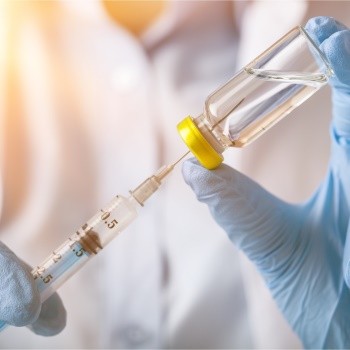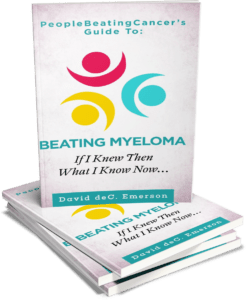
Recently Diagnosed or Relapsed? Stop Looking For a Miracle Cure, and Use Evidence-Based Therapies To Enhance Your Treatment and Prolong Your Remission
Multiple Myeloma an incurable disease, but I have spent the last 25 years in remission using a blend of conventional oncology and evidence-based nutrition, supplementation, and lifestyle therapies from peer-reviewed studies that your oncologist probably hasn't told you about.
Click the orange button to the right to learn more about what you can start doing today.
- You are here:
- Home »
- Blog »
- Multiple Myeloma »
- Stage 1 Symptomatic Multiple Myeloma-
Stage 1 Symptomatic Multiple Myeloma-

“Currently, 50.7% of all patients with MM are living more than 5 years, yet stratification… with 82% of stage I patients living more than 5 years…”
My mother has just been diagnosed with symptomatic MM at age 65. She told me that her RBC count had dropped from 140 in September to 104 in December which is why docs were alerted.
My mom does not know her monoclonal protein (m-spike) count. She is also pretty much asymptomatic ie. she does not have any:
- bone lesions,
- kidney problems or
- fatigue aside from the usual exhaustion after a long day of activities.
However, the doctor said that if left untreated, it could lead to severe kidney/renal complications.
Her treatment plan is Bortezomib via injection once a week with Dexmethasone and a new drug on the market called Lenalidomide taken orally for 4 months followed by a stem cell transplant.
That’s as much information I know so far. We have a proper meeting with the doctor next week to discuss the treatment plan in more detail.
I don’t know much about chemo but what I do know is that it’s long term impacts on health can sometimes be worse than it’s ability to rid the body of the cancer cells.
This is why I’ve been researching about alternative methods to support the conventional way or limit the more harmful treatments if we have the choice.
Thanks for your time David and I look forward to your reply. Nancy
Hi Nancy,
I am sorry to learn of your mom’s symptomatic MM. Thanks very much for this basic information about your mom’s situation.
While I agree with your mom’s oncologist that your mom should undergo treatment to stabilize her MM, the issue for you and your mom to consider is the amount of treatment, the amount of toxicity that your mom has.
When you say that your mom is relatively asymptomatic, it makes me think that she is early stage MM. That she does not need a lot of chemo to stabilize her MM.
Specifically:
- The initial treatment plan that you outline, Bortezomib/Lenalidomide/Dexamethasone/ is the standard-of-care induction therapy for MM- it is also called Velcade/Revlimid/Dexamethason or VRD.
- VRD has proven to elicit a 90% plus response in newly diagnosed MM patients. This SOC induction therapy should be an excellent first step for your mom.
- At this point, I think even your oncologist would agree that it doesn’t make sense to plan therapy for your mom beyond VRD. An autologous stem cell transplant is high-dose chemotherapy aka aggressive toxicity.
A growing number of studies (see below) document that newly diagnosed MM patients like your mom can achieve a deep response with VRD and that more chemo, an ASCT, does not lead to a longer overall survival aka length of life.
More chemo means more toxicity which can lead to short, long-term and late stage side effects.
If you register for the MM Cancer Coaching program and consultation I will be able to study her diagnostic information, determine your mom’s stage, if she is experiencing any bone or kidney involvement and be more specific with you about 
- anti-MM nutrition
- anti-MM supplementation (curcumin, black seed oil, others)
- anti-MM lifestyle therapies
My belief is that the MM CC Program and Consultation will enable you and your mom to understand you mom’s situation and make better decisions for her MM and her quality/length of life going forward.
Let me know how you would like to proceed
Hang in there,
David Emerson
- MM Survivor
- MM Cancer Coach
- Director PeopleBeatingCancer
Recommended Reading:
- Stem Cell Transplant for Newly Diagnosed Multiple Myeloma- What are Risks?
- Cancer Coaching Testimonials- PeopleBeatingCancer
- Multiple Myeloma Chemotherapy, Allergy, Hypersensitivity, Side Effects?
Induction Therapy for Newly Diagnosed Multiple Myeloma
“The frontline therapy for newly diagnosed multiple myeloma (MM) has continued to evolve over the last 10 years. There has been a growing emphasis on achieving the best depth of response in the context of minimal residual disease negativity, given its prognostic correlation with superior overall survival.
Another important area of emphasis has been to improve prognostication and staging by including information on disease biology. There also a growing appreciation of global differences in drug access and patterns of care…
The most pertinent decision in the treatment of NDMM is a patient’s appropriateness for transplant with subsequent management based on this choice. Although there are no universally agreed upon transplant eligibility criteria, several factors such as age, performance status, and patient comorbidities are important tenets in determining a patient’s eligibility…
The advent and widespread use of the immunomodulatory agents and proteasome inhibitors in the frontline treatment of MM has significantly improved OS. Currently, 50.7% of all patients with MM are living more than 5 years, yet stratification by the Revised International Staging System (R-ISS) demonstrates significant variability with 82% of stage I patients living more than 5 years…”

